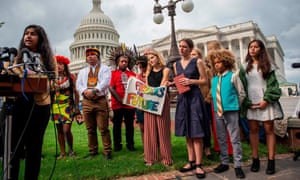The Guardian
Greta Thunberg to Congress: ‘You’re not trying hard enough. Sorry’
The Swedish environmentalist was one of several who spoke at a Senate climate crisis task force
By Lauren Gambino September 17, 2019

At a meeting of the Senate climate crisis task force on Tuesday, lawmakers praised a group of young activists for their leadership, their gumption and their display of wisdom far beyond their years. They then asked the teens for advice on how Congress might combat one of the most urgent and politically contentious threats confronting world leaders: climate change.
Greta Thunberg, the 16-year-old Swedish activist who has galvanized young people across the world to strike for more action to combat the impact of global warming, politely reminded them that she was a student, not a scientist – or a senator.
“Please save your praise. We don’t want it,” she said. “Don’t invite us here to just tell us how inspiring we are without actually doing anything about it because it doesn’t lead to anything.
“If you want advice for what you should do, invite scientists, ask scientists for their expertise. We don’t want to be heard. We want the science to be heard.”
In remarks meant for Congress as a whole, she said: “I know you are trying but just not hard enough. Sorry.”
The audience laughed. Supporters broke into applause. Senator Ed Markey, the Massachusetts Democrat who co-sponsored the Green New Deal and leads the Senate task force, was perhaps surprised by her bluntness. But he smiled.
Seated at the table with the teens were some of the most sympathetic and vocal supporters of bold action on climate change in Congress. But facing a Republican-controlled Senate and a hostile White House, the prospect of enacting reforms at the scale and scope called for by activists – and many scientists – is bleak.
“We need your leadership,” he told Thunberg. “Young people are the army politically, which has arrived in the United States. You put a spotlight on this issue in a way that it has never been before. And that is creating a new X factor.”
Still, Markey vowed to try: “We hear you. We hear what you’re saying and we will redouble our efforts.”
Thunberg was one of several youth activists invited to address the task force during two days of action and speeches aimed at urging lawmakers to support “transformative climate action”. She was joined by activists from across the US and South America, part of a “multiracial, intergenerational” effort to combat climate change.
The meetings and speeches in Washington are intended to raise awareness ahead of a global climate strike on Friday in which students and workers will walk out of schools and offices to pressure their governments to act as world leaders gather in New York for the annual United Nations summit.

“The generation of the Green New Deal will not only survive but we will thrive,” said Nadia Nazar, co-founder of the advocacy group Zero Hour, at a news conference earlier on Tuesday.
“We will no longer be known as the kids fighting the apocalypse. We will be known as the solution to the climate crisis.”
In the US, support for sweeping action on climate change is polarized. Many Republicans – among them Donald Trump – are still openly skeptical of the science behind global warming. Republican leaders have mocked Democrats for introducing a Green New Deal and have used the proposal as a cudgel against lawmakers and presidential candidates.
The Green New Deal is an ambitious 14-page resolution that calls for a “10-year national mobilization” that would eliminate the nation’s emissions in one decade. Scientists say limiting warming to 1.5C would require cutting man-made carbon levels by 45% by 2030 and reaching net zero around 2050.
Markey said their movement is shifting the political landscape. The senator pointed to the 2020 presidential debates as evidence of what has changed. Candidates are being asked about climate change and pushed to introduce plans to combat global warming. This is in stark contrast to 2016.
“What has happened? You have happened,” he told the activists. “You are giving this extra level of energy to the political process that is absolutely changing the dynamics of politics in the United States.”
The 2020 election, Markey said, will in many ways be a “referendum on climate change”.
Thunberg arrived in the US after crossing the Atlantic on a solar-powered yacht. She rose to international prominence after launching “Fridays for Future”: student-led strikes that have spread to 135 countries. She has been nominated for a Nobel Peace Prize.
On Monday, she met Barack Obama. The former president shared a photo from their meeting, in which he praised Thunberg as “one of our planet’s greatest advocates” and someone who is “unafraid to push for real action”.
Barack Obama: Just 16, @GretaThurnberg is already one of our planet’s greatest advocates. Recognizing that her generation will bear the brunt of climate change, she’s unafraid to push for real action. She embodies our vision at the @ObamaFoundation: A future shaped by young leaders like her.
Later on Tuesday, the group was scheduled to meet Senate minority leader Chuck Schumer and Alexandria Ocasio-Cortez, who is a co-sponsor of the Green New Deal in the House.
On Wednesday, Thunberg will deliver what has been billed as a “major address” to members of Congress.
As the crisis escalates…
… The Guardian is committed to keeping the story front and center daily, giving issues of environmental degradation, pollution and species extinction the prominence they deserve.
We’re urging other media organizations to make the same commitment and help focus public attention on this global emergency. In the runup to a major UN climate summit on September 23rd, The Guardian is joining forces with more than 250 news organizations from around the world as part of Covering Climate Now.
This is a groundbreaking initiative to increase nationwide media coverage of the climate emergency. We will be sharing a portion of our climate coverage with partners in the network, in the hope that news organizations without dedicated environment desks will have the opportunity to provide in-depth reporting on this issue. By increasing the reach of our climate coverage, our goal is to spark action from our leaders, inspire citizens, and point to systematic change.
But we need your ongoing support to keep delivering quality journalism on the climate crisis–and the many other critical issues we cover, from widespread inequality to the influence of big tech on our lives. At a time when factual information is a necessity, we believe that each of us, around the world, deserves access to accurate reporting with integrity at its heart.
Our editorial independence means we set our own agenda and voice our own opinions. Guardian journalism is free from commercial and political bias and not influenced by billionaire owners or shareholders. This means we can give a voice to those less heard, explore where others turn away, and rigorously challenge those in power.
Every reader contribution, big or small, is so valuable.
